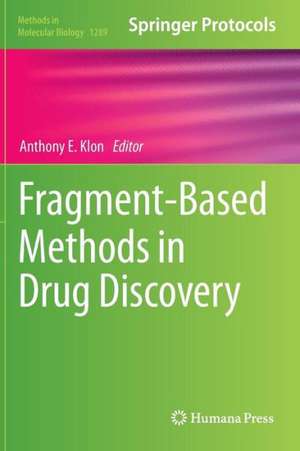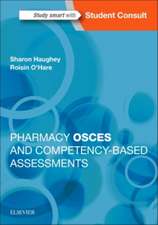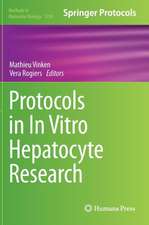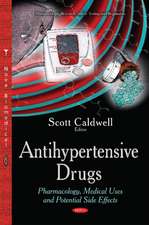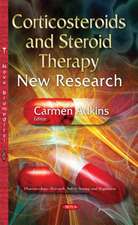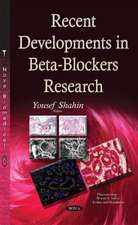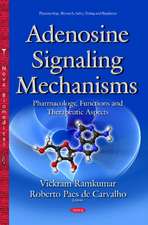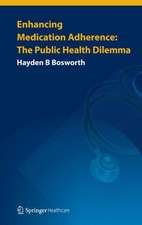Fragment-Based Methods in Drug Discovery: Methods in Molecular Biology, cartea 1289
Editat de Anthony E. Klonen Limba Engleză Hardback – 24 feb 2015
Practical and cutting-edge, Fragment-Based Methods in Drug Discovery takes into account the great accomplishments in the field to provide an ideal guide for researchers continuing to investigate this exciting area of pharmacological study.
| Toate formatele și edițiile | Preț | Express |
|---|---|---|
| Paperback (1) | 618.32 lei 38-44 zile | |
| Springer – 5 oct 2016 | 618.32 lei 38-44 zile | |
| Hardback (1) | 724.70 lei 6-8 săpt. | |
| Springer – 24 feb 2015 | 724.70 lei 6-8 săpt. |
Din seria Methods in Molecular Biology
- 9%
 Preț: 791.59 lei
Preț: 791.59 lei - 23%
 Preț: 598.56 lei
Preț: 598.56 lei - 20%
 Preț: 882.95 lei
Preț: 882.95 lei -
 Preț: 252.04 lei
Preț: 252.04 lei - 5%
 Preț: 802.69 lei
Preț: 802.69 lei - 5%
 Preț: 729.61 lei
Preț: 729.61 lei - 5%
 Preț: 731.43 lei
Preț: 731.43 lei - 5%
 Preț: 741.30 lei
Preț: 741.30 lei - 5%
 Preț: 747.16 lei
Preț: 747.16 lei - 15%
 Preț: 663.45 lei
Preț: 663.45 lei - 18%
 Preț: 1025.34 lei
Preț: 1025.34 lei - 5%
 Preț: 734.57 lei
Preț: 734.57 lei - 18%
 Preț: 914.20 lei
Preț: 914.20 lei - 15%
 Preț: 664.61 lei
Preț: 664.61 lei - 15%
 Preț: 654.12 lei
Preț: 654.12 lei - 18%
 Preț: 1414.74 lei
Preț: 1414.74 lei - 5%
 Preț: 742.60 lei
Preț: 742.60 lei - 20%
 Preț: 821.63 lei
Preț: 821.63 lei - 18%
 Preț: 972.30 lei
Preț: 972.30 lei - 15%
 Preț: 660.49 lei
Preț: 660.49 lei - 5%
 Preț: 738.41 lei
Preț: 738.41 lei - 18%
 Preț: 984.92 lei
Preț: 984.92 lei - 5%
 Preț: 733.29 lei
Preț: 733.29 lei -
 Preț: 392.58 lei
Preț: 392.58 lei - 5%
 Preț: 746.26 lei
Preț: 746.26 lei - 18%
 Preț: 962.66 lei
Preț: 962.66 lei - 23%
 Preț: 860.21 lei
Preț: 860.21 lei - 15%
 Preț: 652.64 lei
Preț: 652.64 lei - 5%
 Preț: 1055.50 lei
Preț: 1055.50 lei - 23%
 Preț: 883.85 lei
Preț: 883.85 lei - 19%
 Preț: 491.88 lei
Preț: 491.88 lei - 5%
 Preț: 1038.84 lei
Preț: 1038.84 lei - 5%
 Preț: 524.15 lei
Preț: 524.15 lei - 18%
 Preț: 2122.34 lei
Preț: 2122.34 lei - 5%
 Preț: 1299.23 lei
Preț: 1299.23 lei - 5%
 Preț: 1339.10 lei
Preț: 1339.10 lei - 18%
 Preț: 1390.26 lei
Preț: 1390.26 lei - 18%
 Preț: 1395.63 lei
Preț: 1395.63 lei - 18%
 Preț: 1129.65 lei
Preț: 1129.65 lei - 18%
 Preț: 1408.26 lei
Preț: 1408.26 lei - 18%
 Preț: 1124.92 lei
Preț: 1124.92 lei - 18%
 Preț: 966.27 lei
Preț: 966.27 lei - 5%
 Preț: 1299.99 lei
Preț: 1299.99 lei - 5%
 Preț: 1108.51 lei
Preț: 1108.51 lei - 5%
 Preț: 983.72 lei
Preț: 983.72 lei - 5%
 Preț: 728.16 lei
Preț: 728.16 lei - 18%
 Preț: 1118.62 lei
Preț: 1118.62 lei - 18%
 Preț: 955.25 lei
Preț: 955.25 lei - 5%
 Preț: 1035.60 lei
Preț: 1035.60 lei - 18%
 Preț: 1400.35 lei
Preț: 1400.35 lei
Preț: 724.70 lei
Preț vechi: 762.85 lei
-5% Nou
Puncte Express: 1087
Preț estimativ în valută:
138.67€ • 145.17$ • 114.74£
138.67€ • 145.17$ • 114.74£
Carte tipărită la comandă
Livrare economică 05-19 aprilie
Preluare comenzi: 021 569.72.76
Specificații
ISBN-13: 9781493924851
ISBN-10: 1493924850
Pagini: 240
Ilustrații: IX, 230 p. 68 illus., 53 illus. in color.
Dimensiuni: 178 x 254 x 22 mm
Greutate: 0.64 kg
Ediția:2015
Editura: Springer
Colecția Humana
Seria Methods in Molecular Biology
Locul publicării:New York, NY, United States
ISBN-10: 1493924850
Pagini: 240
Ilustrații: IX, 230 p. 68 illus., 53 illus. in color.
Dimensiuni: 178 x 254 x 22 mm
Greutate: 0.64 kg
Ediția:2015
Editura: Springer
Colecția Humana
Seria Methods in Molecular Biology
Locul publicării:New York, NY, United States
Public țintă
Professional/practitionerCuprins
Solvation Methods for Protein-Ligand Docking.- Binding Site Druggability Assessment in Fragment-Based Drug Design.- Generating "Fragment-Based Virtual Library" Using Pocket Similarity Search of Ligand-Receptor Complexes.- Virtual Fragment Preparation for Computational Fragment-Based Drug Design.- Fragment Library Design: Using Cheminformatics and Expert Chemists to Fill Gaps in Existing Fragment Libraries.- Protocol for Fragment Hopping.- Site Identification by Ligand Competitive Saturation (SILCS) Simulations for Fragment-Based Drug Design.- A Computational Fragment-Based De Novo Design Protocol Guided by Ligand Efficiency Indices (LEI).- Scoring Functions for Fragment-Based Drug Discovery.- Computational Methods for Fragment-Based Ligand Design: Growing and Linking.- Design Strategies for Computational Fragment-Based Drug Design.- Protein Binding Site Analysis for Drug Discovery Using a Computational Fragment-Based Method.- Fragment-Based Design of Kinase Inhibitors: A Practical Guide.- Designing a Small Molecule Erythropoietin Mimetic.- Designing an Orally Available Non-Toxic p38 Inhibitor with a Fragment-Based Strategy.
Textul de pe ultima copertă
This volume covers the techniques necessary for a successful fragment-based drug design project, beginning from defining the problem in terms of preparing the protein model, identifying potential binding sites, and the consideration of various candidate fragments for simulation. The second part discusses the technical aspects that various methods have used to simulate fragment binding to a target protein by using Monte Carlo, molecular dynamics, and docking algorithms. After simulations, fragments are assembled into molecules using a variety of approaches, which are explored next. A discussion of design strategies and consideration of drug-like properties is included as part of the design process at this stage. Finally, several examples of successful fragment-based drug design projects are presented. Written for the Methods in Molecular Biology series, this work contains the kind of detailed description and implementation advice to encourage success in the lab.
Practical and cutting-edge, Fragment-Based Methods in Drug Discovery takes into account the great accomplishments in the field to provide an ideal guide for researchers continuing to investigate this exciting area of pharmacological study.
Practical and cutting-edge, Fragment-Based Methods in Drug Discovery takes into account the great accomplishments in the field to provide an ideal guide for researchers continuing to investigate this exciting area of pharmacological study.
Caracteristici
Includes cutting-edge methods and examples of successful fragment-based drug design Provides step-by-step detail essential for reproducible results Features implementation tips from the experts Includes supplementary material: sn.pub/extras
